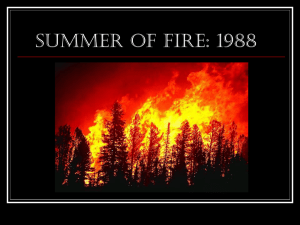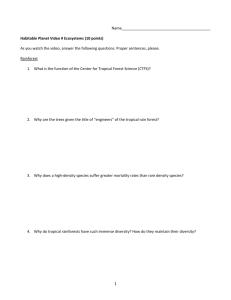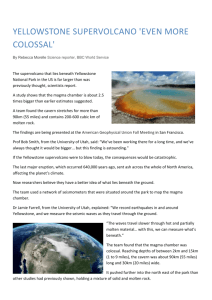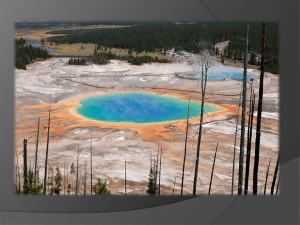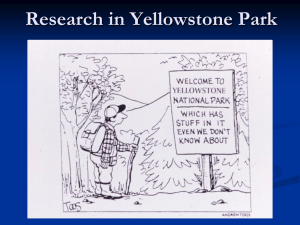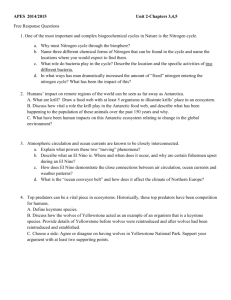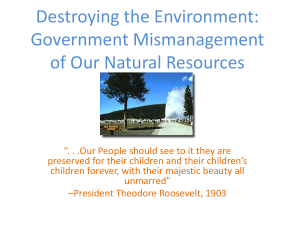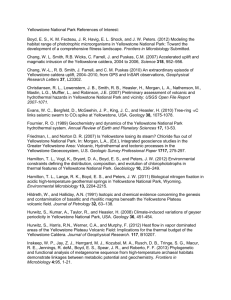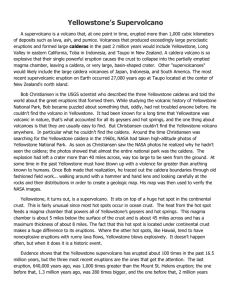Roosevelt Rendezvous
advertisement
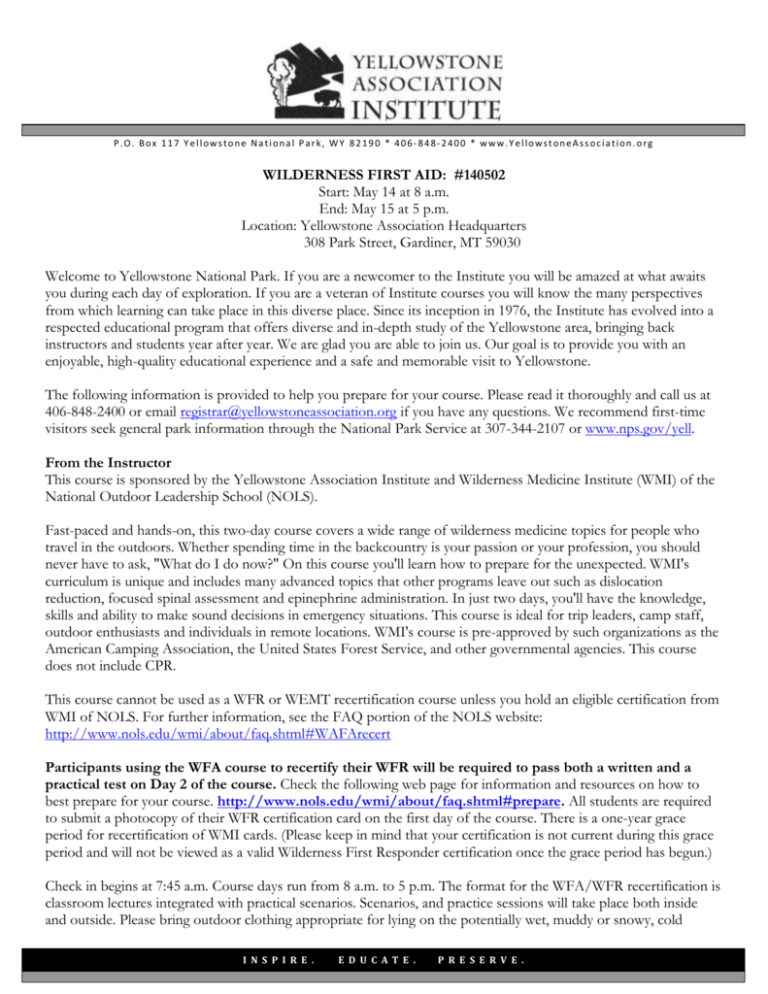
P.O. Box 117 Yellowstone National Park, WY 82190 * 406-848-2400 * www.YellowstoneAssociation.org WILDERNESS FIRST AID: #140502 Start: May 14 at 8 a.m. End: May 15 at 5 p.m. Location: Yellowstone Association Headquarters 308 Park Street, Gardiner, MT 59030 Welcome to Yellowstone National Park. If you are a newcomer to the Institute you will be amazed at what awaits you during each day of exploration. If you are a veteran of Institute courses you will know the many perspectives from which learning can take place in this diverse place. Since its inception in 1976, the Institute has evolved into a respected educational program that offers diverse and in-depth study of the Yellowstone area, bringing back instructors and students year after year. We are glad you are able to join us. Our goal is to provide you with an enjoyable, high-quality educational experience and a safe and memorable visit to Yellowstone. The following information is provided to help you prepare for your course. Please read it thoroughly and call us at 406-848-2400 or email registrar@yellowstoneassociation.org if you have any questions. We recommend first-time visitors seek general park information through the National Park Service at 307-344-2107 or www.nps.gov/yell. From the Instructor This course is sponsored by the Yellowstone Association Institute and Wilderness Medicine Institute (WMI) of the National Outdoor Leadership School (NOLS). Fast-paced and hands-on, this two-day course covers a wide range of wilderness medicine topics for people who travel in the outdoors. Whether spending time in the backcountry is your passion or your profession, you should never have to ask, "What do I do now?" On this course you'll learn how to prepare for the unexpected. WMI's curriculum is unique and includes many advanced topics that other programs leave out such as dislocation reduction, focused spinal assessment and epinephrine administration. In just two days, you'll have the knowledge, skills and ability to make sound decisions in emergency situations. This course is ideal for trip leaders, camp staff, outdoor enthusiasts and individuals in remote locations. WMI's course is pre-approved by such organizations as the American Camping Association, the United States Forest Service, and other governmental agencies. This course does not include CPR. This course cannot be used as a WFR or WEMT recertification course unless you hold an eligible certification from WMI of NOLS. For further information, see the FAQ portion of the NOLS website: http://www.nols.edu/wmi/about/faq.shtml#WAFArecert Participants using the WFA course to recertify their WFR will be required to pass both a written and a practical test on Day 2 of the course. Check the following web page for information and resources on how to best prepare for your course. http://www.nols.edu/wmi/about/faq.shtml#prepare. All students are required to submit a photocopy of their WFR certification card on the first day of the course. There is a one-year grace period for recertification of WMI cards. (Please keep in mind that your certification is not current during this grace period and will not be viewed as a valid Wilderness First Responder certification once the grace period has begun.) Check in begins at 7:45 a.m. Course days run from 8 a.m. to 5 p.m. The format for the WFA/WFR recertification is classroom lectures integrated with practical scenarios. Scenarios, and practice sessions will take place both inside and outside. Please bring outdoor clothing appropriate for lying on the potentially wet, muddy or snowy, cold I N S P I R E . E D U C A T E . P R E S E R V E . ground playing the role of both rescuer and patient. Frequently, stage (moulage) blood and make-up will be used to emphasize the reality of a scenario. Generally the classroom environment lends itself to a pair of comfy shoes/slipper and a crazy creek-type chair. Please come equipped with a light day pack, waterproof top and bottom, light hiking boots, and layers well suited for spending time outside playing the role of patient and rescuer. Wilderness Medicine Institute Staff Itinerary Day 1 Introductions .5 hour Assessment: Patient Assessment System 3.5 hours Initial Assessment Focused History, Vital Signs, Patient Exam Documentation Lunch (1 hour) Spine and Head Injury: Spinal Cord Injury Management Head Injuries 1 hour .5 hour Shock, Bleeding, Wounds: Shock Wilderness Wound Management .75 hour 1.75 hours Day 2 Focused Spine Assessment .5 hour Musculoskeletal Injury: Athletic Injuries Fractures Traction Splinting Dislocations .75 hour .75 hour 1 hour .5 hour Lunch (1 hour) Environmental: Heat Cold Injuries Lightning Altitude Illness .5 hour .75 hour .5 hour .5 hour Medical Topics: Acute Abdomen Anaphylaxis The Unconscious Patient Wilderness First Aid Kits .5 hour .5 hour .5 hour .25 hour I N S P I R E . E D U C A T E . P R E S E R V E . What’s included? Your tuition includes daily outings and transportation during your program. It does not include transportation to the park, park entrance fees*, meals or lodging. Tips are not accepted on Field Seminars; however donations to the Institute are accepted if you would like to recognize an exemplary program. *Please note: In an effort to provide additional financial support to Yellowstone National Park, park entrance fees will no longer be included in Field Seminar registration. The entrance fee is $25 for a private, noncommercial vehicle; $20 for each snowmobile or motorcycle; or $12 for each visitor 16 and older entering by foot, bike, ski, etc. This fee provides the visitor with a 7-day entrance permit for both Yellowstone and Grand Teton national parks. Please carry your permit with you each day while on your course. Lodging Option Institute students in field seminars based out of Gardiner, Montana, may have the opportunity to stay in our comfortable lodging at the Yellowstone Overlook Field Campus for an additional charge. The Yellowstone Overlook features comfortable cabins on 80 acres, awe-inspiring views and easy access to the northern section of the park. Cabins include self-serve kitchens for preparing meals and open-floor plans for group dining and evening activities. For more information please see the last page of this document. Feel free to call our contact center at 406-848-2400 to make your reservations today. Rooms will also be held until 30 days prior to the course at the Yellowstone Super 8 in Gardiner for students attending this course. To make your reservation, please call 406-848-7401 and mention you are taking a Yellowstone Association Institute course. Continuing Education Credit Our field seminars are recognized by universities across the country. We are happy to provide a letter of completion and supporting documentation that you can submit for university credit or CEUs through the institution of your choice. Park Store Our Park Store features more than 900 books, maps and videos to help you plan your visit, along with a wide selection of shirts, hats and other logo items to remind you of your visit to Yellowstone. Yellowstone Association members receive a 15 percent discount on merchandise. Proceeds support education and research in Yellowstone. Visit: www.yellowstoneassociation.org/store Membership Yellowstone Association members directly fund education and research, provide scholarships for teachers and expand programming for underserved youth. Member benefits include a subscription to our magazine Yellowstone Quarterly, early registration and discounts for Institute courses and discounts on retail purchases throughout Yellowstone (exclusions apply). How fit do you need to be? This course may include leisurely hikes up to one mile per day through relatively flat terrain on maintained trails. See the “From the Instructor” section for more specific details about outside activities. We recommend you begin an exercise program right away if you have not already done so. Participants residing at lower elevations may want to arrive a day early to adjust to the altitude. To learn more about how specific medical conditions can be affected by Yellowstone's environment and our activities, go to www.tinyurl.com/yahealth I N S P I R E . E D U C A T E . P R E S E R V E . Code of Ethics The Yellowstone Association Institute is committed to demonstrating a high standard of appropriate and ethical behavior in Yellowstone. As a participant in an Institute program, we ask you to adhere to the following Code of Ethics. In addition to the ethics highlighted below, the Institute abides by all National Park Service rules and regulations. We also practice Leave No Trace guidelines for traveling responsibly in the wilderness. Observing Wildlife: We will do our best to have as little impact on wildlife as possible. Animals will be observed from a distance, using high-powered spotting scopes to help keep our presence from affecting their behavior. Participants should not expect to get close-up photographs of wildlife. The Institute will adhere to National Park Service regulations by keeping a minimum distance of 25 yards from bison, elk, bighorn sheep, deer, moose, coyotes and nesting birds and 100 yards from bears and wolves. We will not entice wildlife with food, animal calls or any actions that change their behavior. Leave What You Find: It is illegal to remove natural or cultural artifacts (plants, animals, bones, rocks, etc.) from Yellowstone. Institute instructors have permission from the National Park Service to manipulate plants, rocks, bones, etc. for educational purposes and will return them to their natural positions and locations. General Etiquette: Institute groups will be considerate of other visitors and respect the quality of their experience. Voices and vehicle sounds carry great distances and affect both wildlife and people - remaining silent or very quiet while watching wildlife lets the sounds of Yellowstone (including wolf howls) prevail. Roads and Vehicles: Expect wildlife on the road, and drive at or below the posted park speed limits. When stopping to observe wildlife or other park features, the Institute will move vehicles entirely off the road. If there is no safe pullout available, we will drive to the next safe place and walk back to observe the wildlife. We will not stop in the middle of the road, and should a traffic jam develop as a result of our activities, we will cease the activity. Properly Dispose of Waste: We will pack out all trash, leftover food and litter. Your instructor will discuss techniques for properly disposing of human waste in the field. Traveling Lightly: When hiking or walking in Yellowstone, we will use existing trails and boardwalks. We will follow appropriate techniques when walking off-trail. Walking around muddy or wet places in the trail increases erosion and negatively affects the resource; proper equipment is essential to hiking ethically. Participants should come adequately prepared with the equipment listed for their course and should expect to walk through mud, snow or puddles in the trail. Thank you for helping us set a good example in Yellowstone! I N S P I R E . E D U C A T E . P R E S E R V E . General Clothing and Equipment List Much of your time will be spent outdoors and all programs are held rain, snow or shine. You should be prepared for a variety of mountain weather conditions and temperatures. Appropriate clothing, equipment and footwear are very important. Spring, summer and fall temperatures can range from below freezing in the mornings to 85 degrees Fahrenheit in the afternoons. The layered use of garments for protection against the wind, sun and temperature extremes should guide your clothing choices. Loose-fitting layers allow you to maintain a comfortable and dry body as outside temperatures change and as your own body’s temperature and moisture output changes with different levels of exertion. Some colder-weather items may not be needed in July or August, but keep in mind Yellowstone’s weather is unpredictable. Equipment: □ Daypack, with enough capacity to carry extra clothes, water, lunch, camera, binoculars, field guides, etc. □ Water bottle, one-quart is the minimum. Camelback or similar hydration systems work well in summer but can freeze in winter. □ Sunglasses. □ Sunscreen/lip protector. Sun at high altitude can burn unprotected skin quickly. □ Camera, binoculars. □ Notebook/pencil. □ Pocket hand and foot warmers – recommended November through May. Summer Clothing: □ Insulating underwear, capilene, polypropylene, or similar wicking fabric. □ Midweight insulating layer, light, 200-weight synthetic fleece or wool shirt/pullover. □ Heavyweight insulating layer, wool, down, or heavy-weight fleece jacket, for less-active times. □ Waterproof and windproof outer layer, lightweight and breathable. Jackets and pants are recommended. □ Short sleeved shirt, cotton isokay in summer, but synthetic wicking shirts are ideal. □ Pants, synthetic hiking pants, lightweight pile/fleece pants or tights or similar. Jeans are not recommended. □ Hats, both a brimmed sun hat and an insulating hat for cool weather. □ Gloves, lightweight glove liners and a pair of wool/fleece gloves or mittens. □ Socks, light wool or synthetic liner sock with heavier wool or synthetic outer sock. The inner-outer sock combination helps prevent blistering, wicks moisture and reduces friction. Cotton socks do not wick moisture and are not recommended. □ Hiking boots, that provide stability, traction, and comfort. Unless you’ve consistently hiked in athletic shoes, bring boots that provide ankle support. □ Off-duty shoes, sandals, athletic shoes, or other leisure footwear. I N S P I R E . E D U C A T E . P R E S E R V E . Travel Information Plan on extra driving time in the park. The speed limit is 45 mph or lower. There may also be construction delays. Visit www.nps.gov/yell/planyourvisit/hours.htm, call the NPS Road Report at 307-344-2117 or contact a visitor center for up-to-date travel information. I N S P I R E . E D U C A T E . P R E S E R V E . Directions: From Livingston, travel south on Highway 89 into Gardiner, Montana. Just before you cross the Yellowstone River, you will see the Cenex gas station on your right and 4th Street on your left. Turn left on 4th Street (you'll see a green sign indicating 5 miles to Jardine) and go up the hill for 1.5 miles. Turn right on Above the Rest Lane at the sign for the Yellowstone Overlook Field Campus (by the mountain man carving) and follow the signs to the cabins. From Yellowstone, leave the park through the North Entrance and go through the Roosevelt Arch. Turn left on Highway 89 towards Livingston. Cross the bridge over the Yellowstone River. You will see the Cenex gas station on your left and 4th Street on your right. Turn right on 4th Street (you'll see a green sign indicating 5 miles to Jardine) and go up the hill for 1.5 miles. Turn right on Above the Rest Lane at the sign for the Yellowstone Overlook Field Campus (by the mountain man carving) and follow the signs to the cabins. What to bring: Each cabin includes a fully equipped kitchen for you to prepare meals. You will need to bring your own food and toiletries. Groceries are available nearby in Gardiner. Linens and towels are provided. Smoking is not allowed in the cabins. Camping and pets (with the exception of service animals) are not permitted. Arrival and departure: Our volunteer campus host will be available to greet you between 4 and 8 p.m. on the day of your arrival. Check out is by 9 a.m. the day of your departure to allow our volunteers to begin preparing the cabins for the next group. Parking is available in front of your cabin. Please do not store food in your vehicle as it can attract animals. If you are visiting during the winter we recommend an all-wheel- or 4-wheel-drive vehicle as roads can be snowpacked and icy. Feel free to call our office at 406-848-2400 Monday through Friday from 8 a.m. to 4:30 p.m. to check the local weather and road conditions. During your stay: Our volunteer caretakers live on-campus in the cabin with the “Welcome” sign. They will help orient you to the Overlook campus. An emergency phone is available all hours outside their cabin. We do not have a housekeeping staff at the Overlook. Quiet hours are observed between 10 p.m. and 6 a.m. Verizon is the only cell phone provider currently providing reliable coverage at the campus. In the event of an emergency during your stay, the caretaker’s cabin phone number is: 406-848-9128. Wireless Internet is available in the cabins and at several businesses in Gardiner. The campus has a picnic table and pond. A marked, 1-mile-long trail leads down to the Yellowstone River. Wildlife is abundant. You may see bison, wolves, elk and deer. You may also see rattlesnakes. Please exercise caution, and notify someone of your plans if you will be away from the campus alone. Each cabin has a TV/DVD player and an educational library with books and videos. The Overlook is designed to be a comfortable and peaceful base from which to explore and learn in America’s first national park. We look forward to your visit! I N S P I R E . E D U C A T E . P R E S E R V E .
